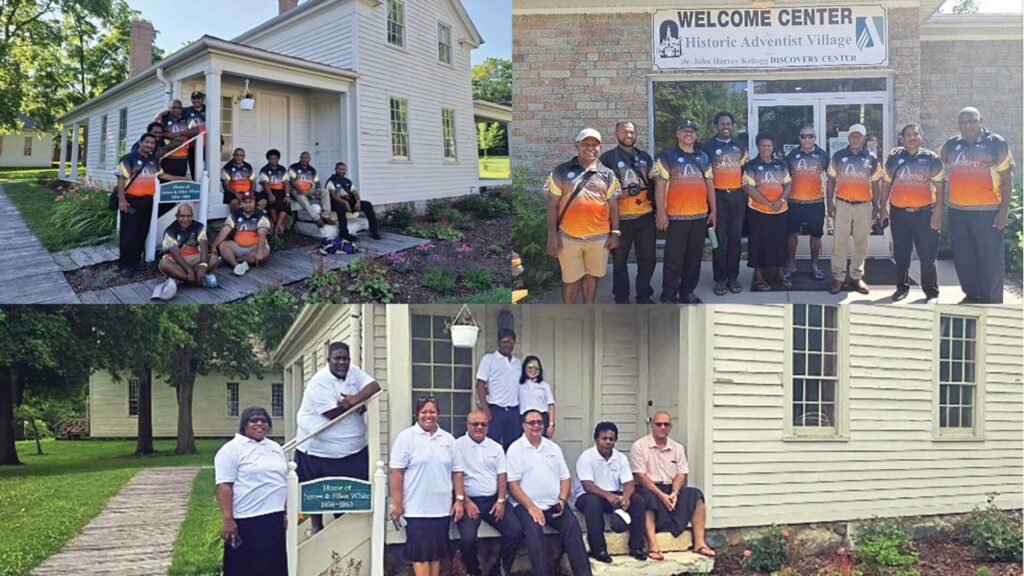I live in New Zealand, but I now work in Fiji. I recently returned from Vanuatu and the Solomon Islands, and I was asked if a person had to return their tithe to the Seventh-day Adventist Church. Today, many Adventist members in New Zealand, Australia and the Pacific think it is their right to decide where their tithe should be used.1
What does the Bible have to say? Is Ellen White silent on this crucial subject?
Let’s begin by stressing that most questions or excuses regarding the return of tithe to the organised Seventh-day Adventist Church are primarily based on misconceptions. A few years ago, I asked the leader of an offshoot movement from the Adventist Church in New Zealand if he was returning tithe to the local conference. He responded that he did not believe the tithe money should be returned there. I applauded his honesty but counselled as Samuel did to Saul: “To obey is better than sacrifice, and to heed is better than the fat of rams” (1 Samuel 15:22 NIV). The fundamental flaw of assuming one’s right to decide how the tithe may be used is the misunderstanding that (1) the tithe is ours and (2) we may decide how it is used. Both these assumptions are wrong. The tithe is not ours, and we cannot decide how something that does not belong to us will be used.
What God says about tithes
1. Leviticus 27:30:
“And all the tithe of the land, whether of the seed of the land or of the fruit of the tree, is the Lord’s. It is holy to the Lord” (NKJV).
There are several essential words or phrases in this text: (1) The Hebrew מַעֲשֵׂר (ma‘aser) means “a tenth”. It is derived from עֶשֶׂר (‘eser), “ten”. (2) The “tithe” “is the Lord’s” לַיהוָה (la-YHWH) or “belongs to Yahweh” (NIV, NLT, and CSB). The preposition ל (lamed) denotes possession or dedication, which is reinforced by the qualifying phrase הוּא קֹדֶשׁ לַיהוָה (hu qodesh la-YHWH) “It is holy to the Lord.” The term qodesh means “to set apart, consecrate or sacred”, and the repetition of לַיהוָה (la-YHWH) reinforces divine ownership of “all” the tithe. Thus, returning the tithe is not a voluntary offering but a requirement. This is the role of stewardship reinforced in other passages like Genesis 1:28, 2:15; Leviticus 25:23; 1 Chronicles 29:14; Psalm 24:1; Matthew 25:14-30; Luke 12:42-44; 1 Corinthians 4:1,2; Colossians 3:23,24; and 1 Peter 4:10. Stewards take care of the tithe. They do not decide on how the tithe is used. Nor do they pay tithes; they return to God what belongs to Him.
2. Numbers 18:21:
“Behold, I have given the children of Levi all the tithes in Israel as an inheritance in return for the work which they perform, the work of the tabernacle of meeting” (NKJV).
Several important phrases need to be underscored in this text: (1) The word נָתַתִּי (natatti) is translated as “I have given.” This is a first-person verb, which means that it is God who gives the tithe to the children of Levi (Levites). The Levites were “chosen” by God to serve as priests and caretakers of the Tabernacle (Exodus 28:1; Numbers 3:5,6, 8:14) and the ones entitled to use the tithe. The phrase כָּל־מַעְשֵׂר (kol-ma‘aser) “all the tithe” means the entirety of the tithe belongs to God. Not a single portion of the tithe belongs to us. Hence, only God decides the use and distribution of the tithe. The point is further reinforced by the Hebrew לְנַחֲלָה (le-nachalah), “As an inheritance”, which clarifies that the tithe is the portion of the Levites given by God. It reiterates divine ownership and prerogative for the use of tithes.
3. Malachi 3:8:
“Will a man rob God? Yet you have robbed Me! But you say, ‘In what way have we robbed You?’ In tithes and offerings” (NKJV).
The phrase הֲיִקְבַּע (ha-yiqba‘), “Will a man rob God?” the Hebrew verb קָבַע (qaba‘) appears only twice in the OT (Malachi 3:8; Proverbs 22:23); it means robbing, plundering or defrauding. The accusative sense means that God is the direct object of the robberyבַּמַּעֲשֵׂר (ba-ma‘aser) “In the tithe.” The preposition ב (ba) indicates the fraud is in or through the withholding of tithes, וּבַתְּרוּמָה (u-va-terumah), “And in the offerings.” What more serious accusation can there be when the creature robs the Creator?
The emphasis is on the accusation of theft. This implies that those who withhold or take tithes by defrauding members of the Church are robbing God. Those who steal from God or defraud members by soliciting tithe for their use will face judgement.
What does Ellen White have to say?
Some have been dissatisfied and have said, “I will not longer pay my tithe; for I have no confidence in the way things are managed at the heart of the work.” But will you rob God because you think the management of the work is not right? Make your complaint, plainly and openly, in the right spirit, to the proper ones. Send in your petitions for things to be adjusted and set in order; but do not withdraw from the work of God, and prove unfaithful, because others are not doing right (p 249, italics added).
Some have been dissatisfied and have said, “I will not longer pay my tithe; for I have no confidence in the way things are managed at the heart of the work.” But will you rob God because you think the management of the work is not right? Make your complaint, plainly and openly, in the right spirit, to the proper ones. Send in your petitions for things to be adjusted and set in order; but do not withdraw from the work of God, and prove unfaithful, because others are not doing right (p 249, italics added).
God has given special direction as to the use of the tithe. He does not design that His work shall be crippled for want of means. That there may be no haphazard work and no error, He has made our duty on these points very plain. The portion that God has reserved for Himself is not to be diverted to any other purpose than that which He has specified. Let none feel at liberty to retain their tithe, to use according to their own judgement. They are not to use it for themselves in an emergency, nor to apply it as they see fit, even in what they may regard as the Lord’s work (Testimonies vol 9, 247, italics added).
What is the take-home message?
We own nothing. God has entrusted us as His stewards to manage the tithe properly.
Individuals who use the tithe or private organisations that defraud members by soliciting tithe money have committed a crime against God; they have rebelled against the remnant Church and Christ, the head of the Church. Those who think they have the liberty to do with the tithe as they please will face God’s judgement.
What can we do as church members to curb the torrential tides of rationalism, relativism and independent rival ministries that misuse tithes and offerings? I have a few suggestions:

- Adventist pastors need to lead by example. Do not invite or use members of independent groups in Adventist pulpits or churches. Independent groups work through infiltration.2 This practice needs to stop. Pastors (who are paid by tithe money) rob God when they fail their duty to protect the Church, the tithe and members of the Church from being deceived by false prophets.3
- Be proactive in addressing issues or teachings of independent rival groups to the Adventist Church. Do not wait for heresies to spread in the Church before addressing them. Help Adventist members identify heresies before they come.4 Call sin by its proper name.
- Reaffirm the biblical foundations of the Bible and Adventist Fundamental beliefs and the writings of Ellen White and encourage our members to remain faithful to God’s counsels and instructions regarding tithes and offerings.
The Bible and Ellen White clearly state that tithes should only be used for God’s divine purpose. There is no other option. Any teaching that supports the use of tithes for individual use or support of independent ministries is heresy and treason of the highest order against God’s divine rulership and ownership. Let’s encourage each other to remain faithful to the teachings of Scripture regarding this vital subject.
- These sentiments are not new. I was a member of independent and rival ministries for 15 years, and the rationale today is no different from the late 1970s and 1980s. However, the trend is increasing, and the impact of heretical teachings by rival groups in the US, Australia and New Zealand is creating crippling effects throughout the Pacific region. This has resulted in numerous independent groups throughout the Pacific region thinking themselves entitled to “tithe” money or claiming themselves the faithful “remnant Church”. Most of these groups see the Church as the “apostate” Church.
- They often begin on common ground (like the health message) but eventually diversify into twisted, extreme heresies growing out of Seventh-day Adventist doctrines.
- Jesus and the apostles warned about the proliferation of false prophets at the end of time: Matt 7:15, 24:11, 24; 2 Cor 11:13-15; 2 Tim 4:3,4; 2 Thess 2:9,10; 2 Pet 2:1; 1 John 4:1; and Rev 13:13,14.
- I have defined “heresy” in my theology classes as “the overemphasis of one aspect of truth at the expense of all truth”. The heretical views of independent ministry groups are the product of an “overemphasis of one aspect of Adventist teachings, at the expense of the teachings of Scripture as a whole”. One must recognise that Adventist theology is deeply integrated, consistent and coherent. There are many inconsistencies and contradictions in the theology or teachings of independent groups.
Dr Limoni Manu O’Uiha is the head of theology, Fulton Adventist University College.






